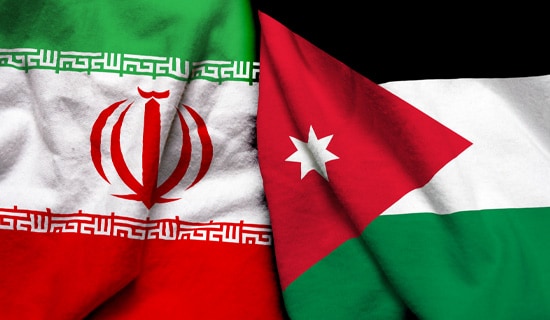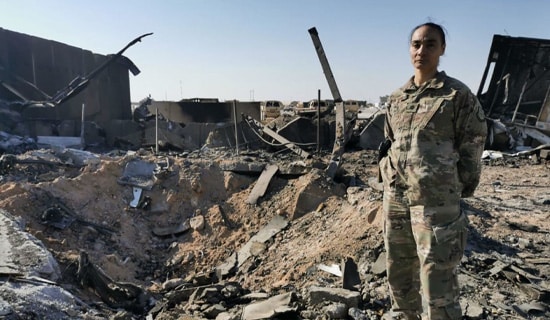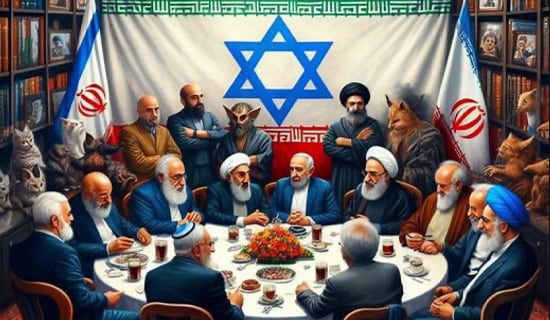Recently, quite a few observers and analysts have suggested that the Chinese Communist Party (CCP) is unfamiliar with Afghanistan and the Taliban, and that the complete withdrawal of American troops from Afghanistan will leave Beijing facing the Taliban directly and destabilize China. However, that is not the case. In fact, the CCP has a decades-long relationship with Afghanistan and has had relations with the Taliban since the 1990s.
Commenting on Afghanistan-China relations, Liu Jinsong, director-general of the Department of Asian Affairs of China's Foreign Ministry and former Chinese Ambassador to Afghanistan, wrote: "Our friendship is commended for sharing weal and woe together. Since modern times, both countries have fought against colonialism, imperialism and hegemony and won national independence at huge expenses. In this process, we have always sympathized with and supported each other."[1]
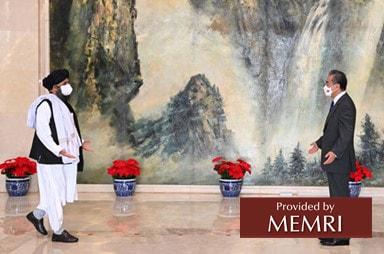
Chinese Foreign Minister Wang Yi met with Taliban co-founder Mullah Abdul Ghani Baradar in Tianjin. (Source: Fmprc.gov.cn, July 28, 2021)
1950-1973 – PRC's Relations With Afghanistan Under The Reign Of King Mohammad Zahir Shah
In 1950, the Kingdom of Afghanistan under the reign of King Mohammad Zahir Shah was one of the first countries to recognize the People's Republic of China (PRC). The two countries established diplomatic relations and exchanged ambassadors on January 20, 1955.
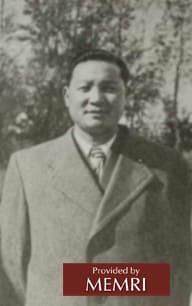
Ding Guoyu, first Chinese ambassador to Afghanistan (1955-1958). (Source: Af.china-embassy.org)
In the 1950s and 1960s, China and Afghanistan maintained close relations, and the heads of state, prime ministers, and other high-level officials of the two countries exchanged visits. Trade pacts as well as a treaty of friendship and non-aggression were signed between the two nations in 1960. On November 22, 1963, Beijing and Kabul signed the Boundary Treaty, which settled the status of their shared border across the Wakhan Corridor and therefore Afghanistan did not have to cede any territory to China.[2]
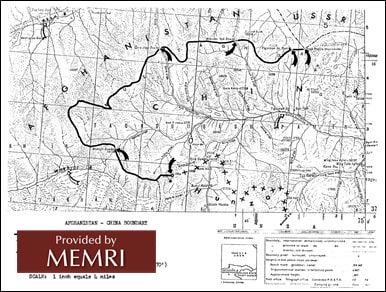
(Source: Twitter)
In October 1964, then Afghan King Mohammad Zahir Shah visited China and met with founding leader of the People's Republic of China (PRC), Mao Zedong, Premier Zhou Enlai and other CCP leaders. On that occasion, Mao opened his meeting with the king, underlying the common fight against Great Britain in the two countries' history. "Afghanistan is a heroic country and has never surrendered," Mao stated.[3]

Afghan King Mohammad Zahir Shah with Mao Zedong in China, 1964.

King Zahir Shah and the Afghan delegation with Mao Zedong, Liu Shaoqi, Zhou Enlai, and CCP members in Beijing, on November 1, 1964. (Source: Twitter)
In 1971, the Kingdom of Afghanistan supported Beijing, voting in favor of the PRC's membership in the United Nations, and Nationalist China (i.e., the Kuomintang representative) was expelled.[4]
1978-1992 – China's Relations With Communist Afghanistan
The CCP Joins Hands With The United States To Fight Against The Soviet Union
In 1973, while King Zahir Shah was abroad, his cousin and former prime minister of Afghanistan Daoud Khan launched a bloodless coup. Khan became the first President of Afghanistan and implemented in the beginning a pro-Soviet policy, but then sought to lessen the country's dependence on the Soviet Union.[5] China immediately recognized the new government. However, in 1978, Daoud Khan was assassinated during the Saur Revolution, led by the Afghan military and the communist People's Democratic Party of Afghanistan (PDPA). The revolution was the prelude to the Soviet invasion of Afghanistan on December 27, 1979.
On December 30, 1979, the CCP joined hands with the United States to fight against the Soviet Union, and issued a government statement, strongly condemning the Soviet invasion of Afghanistan, and refusing to recognize the new Soviet-backed regime, headed by Babrak Karmal, PDPA General Secretary of the Central Committee. The statement read: "... The Soviet Union flagrantly launched a large-scale military invasion of Afghanistan and grossly interfered in the internal affairs of the country. This kind of armed intervention, which flagrantly tramples on the norms of international relations, not only violates the sovereignty and independence of Afghanistan, but also seriously threatens peace and security in Asia and the world. The Chinese government strongly condemns the Soviet Union's hegemonic acts, and insists that the Soviet Union cease its aggression and intervention in Afghanistan and insists that it should withdraw all its armed forces...
"The Soviet armed aggression against Afghanistan is a major exposure of Soviet hegemonism. People have further seen where the main threat to world peace comes from, and what the true face of this so-called 'natural ally' of the third world is, and people have further seen that Soviet hegemony is extremely insane and adventurous. The Soviet Union's aggressive ambitions are endless, and its aggressive behavior must be actually stopped. The perverse actions of the Soviet Union have aroused the resistance of the Afghan people and serious uneasiness and strong condemnation from all countries in the world. The Chinese government and the Chinese people will work with all peace-loving and justice-loving countries and people in an unremitting struggle to defeat Soviet aggression and expansion."[6]
It is worth noting that after Joseph Stalin's death in1953, Mao Zedong and the CCP felt they were finally qualified to compete with the Soviet Union for the leadership of the world communist movement. By July 1964, the ideological war between the two communist parties reached its peak. The CCP said that capitalism had been restored in the Soviet Union, that the Soviet Union was no longer a socialist country, and that China was the center of the world revolution against imperialism and revisionism.
After Nikita Khrushchev was ousted in October 1964, Mao Zedong wanted to improve relations with the Soviet Union and avoid a rupture, and sent Premier Zhou Enlai to Moscow to celebrate the 47th anniversary of the victory of the Soviet October Revolution. But during the visit, the CCP delegation got furious when Soviet Defense Minister Rodion Malinovsky suggested that Mao should be removed from power as well, in order to clear the way for normal relations between the two countries. After Zhou Enlai returned to China, he reported that there was no tendency for the Soviet Union to change course, and hence the CCP continued to criticize the Soviet Union.
In 1966, after the start of the Cultural Revolution, China and the Soviet Union did not break off diplomatic ties. But with the exception of China allowing the Soviet Union to ship supplies through China to North Vietnam during the Vietnam War, relations between the two countries froze completely.
In 1967, Mao's Red Guards stormed the Soviet Embassy in Beijing.
In 1968, the Soviet Union poured troops into the border area near Xinjiang. The Soviet deployment increased to 25 divisions, 1,200 aircrafts, and 200 missiles. At the same time, the Soviet Union and Mongolia reached an agreement that the Soviet would help maintain Mongolia's southern border security and garrison troops there.
In August 1968, when Soviet troops invaded Czechoslovakia to crush the Prague Spring, China denounced the Soviet Union as "social imperialism."
In 1969, the two countries engaged in large-scale armed conflict in the border areas near Northeast China and Northwest China's Xinjiang region. Many Western observers thought a full-scale war was imminent and inevitable.
During the Vietnam War, China moved large numbers of troops from its southern regions to northeast, north and northwest China to guard against a Soviet attack.
In the dangerous situation of simultaneous antagonism with the two superpowers, Mao Zedong believed that the greatest threat came from the Soviet Union. On the one hand, he began to prepare for a war with the Soviet Union; on the other hand, he took advantage of various strategic opportunities, such as the Soviet Union's aggressive posture toward the United States in the Cold War, and the Nixon administration's softening attitude toward the CCP caused by the anti-Vietnam War movement in the United States. Hence, Mao Zedong decided to open the door to improve relations with the United States and Western countries in an all-round way. Finally, in 1971 and 1972, came the Ping Pong Diplomacy,[7] Henry Kissinger's secret visit to Beijing, and Richard Nixon's official visit to China. Therefore, Mao and his Communist Party reached the strategic goal of joining hands with the United States to counter and check the expansion and threat of the Soviet Union.
Chinese Weapons Are Provided To The Mujahideen In Afghanistan
Right after the Soviet Union invaded Afghanistan, the Chinese Communist Party and the United States, in their honeymoon period, joined forces against the Soviet Union for their respective strategic interests. The CCP began to participate in the U.S.-led program to aid Afghan guerrillas to fight against the Soviet invaders. By the mid-1980s, countries assisting the Afghan resistance included Pakistan, Saudi Arabia, the United States, China, and the United Kingdom.
At present, only the role of the United States is mentioned in history books, but China too actively participated in the war against the 40th Army of the Soviet Ground Forces and the government forces of Afghanistan. During this period, Chinese weapons provided to the mujahideen in Afghanistan were mainly infantry weapons, which were low-tech but reliable and suitable for the operation of the Afghan guerrillas. The Chinese version of the AK-47, the Type 56, was one of the main weapons of the Afghan guerrillas. China also provided: 14.5 mm anti-aircraft machine guns Type 58 and Type 78, the Chinese version of the Soviet 12.7 mm DShK heavy machine gun Type 54 HMG, the Type 63 (12-tube, 107mm) multiple rocket launcher,[8] the Type 69 40mm anti-tank rocket launcher and the portable air defense missiles HN-5.[9]
Large quantities of Chinese-made Soviet-style weapons bought by the CIA,[10] along with weapons supplied by countries such as Egypt, were secretly smuggled into Afghanistan via Pakistan every month and handed over to mujahideen groups to fight the Soviet invaders.[11]
In addition, hundreds of Chinese instructors who taught sabotage tactics were sent to training camps and bases in Pakistan. According to data released during the Soviet era, the number of Chinese agents was several times greater the number of CIA agents in the region. [12]

Chinese heavy machine gun Type 54 HMG (Source: Weaponsystems.net)
U.S. And China Signed A Listening Installation To Monitor Soviet Military Activities in Afghanistan
At the same time, Washington began to provide Beijing with a variety of weapons for its own defense against the Soviet Union in 1980. It is worth noting that, during the Carter administration, before the establishment of diplomatic relations between China and the United States[13] negotiations took place behind closed doors, including a series of military cooperation projects, such as a little-known joint China-U.S. intelligence monitoring station program against the Soviet Union, known as Project Chestnut, set up in Xinjiang.
The CIA and the PLA's joint monitoring station project in Xinjiang later came to be seen by the U.S. as the most sincere and valuable one. Because both the CCP and the United States needed to have more information about Soviet military activities in Central Asia, especially early warning of direct military action against China, as well as Soviet military activities in Afghanistan.
The idea of a joint electronic and seismic listening station program was first raised by the United States in 1975, when Henry Kissinger met with Chinese Foreign Minister Qiao Guanhua, but the Chinese side did not agree.
In January 1979, Deng Xiaoping visited the United States. In Deng's last closed-door meeting with the U.S. side, before leaving Washington, President Jimmy Carter and his National Security Adviser Zbigniew Brzezinski were present. Brzezinski again raised the issue of a joint Sino-U.S. monitoring station program, saying it was an important sign of the sincerity of Sino-American cooperation. But the Chinese side still did not answer.
In April 1979, Deng Xiaoping, while receiving a visiting U.S. Senate delegation, suddenly suggested that China could use American equipment to "monitor whether the Soviet Union is fulfilling the disarmament agreements."
Deng also stressed an important principle: the joint monitoring stations can use U.S. equipment, but it must be operated by Chinese military personnel, and the results of the U.S. intelligence analysis must be shared between China and the United States.
The Communist China agreed to the U.S.-proposed project (the internal Chinese code for the program was "7911") in November 1979. The climax of the negotiations took place between in December 1980 and January 1981. According to Chinese media, the United States was represented by Director of Central Intelligence Stansfield Turner, then head of the CIA, and Robert Gates, who later became the U.S. Defense Secretary. They left Andrews Air Force Base on December 27, 1980, to travel to China and returned on January 7, 1981. At the time, CIA Director Turner deliberately grew a beard to hide his identity.
By the fall of 1981, two stations, including two monitoring stations and three different radio interception systems, were set up in Qitai, Changji Prefecture, and Korla city, in Xinjiang.[14] The two monitoring stations in western China replaced Tacksman I and Tacksman II, two CIA ground listening stations in Iran that were taken back by Iran after the Islamic Revolution. [15]
SUPPORT OUR WORK

China Trained Mujahideen Against The Soviet Union in Xinjiang
Meanwhile in Afghanistan, the PLA personnel provided training, arms, organization, financial support, and military advisers to the Afghan mujahideen resistance throughout nearly the entire Soviet military presence in Afghanistan – with the active assistance and cooperation of the CIA.
Until the mid-1980s, most of China's training centers set up by Chinese military advisers and army troops for the Afghan anti-Soviet rebels were located in the Pakistani city of Peshawar and along the Pakistani border. However, as soon as the Soviets arrived in Afghanistan, the region of Xinjiang had become a forward operating base for the Chinese Communist Party's joint efforts with the United States to fight the Soviet Union. China trained several thousand mujahideen in camps near Kashgar and Hotan inside Xinjiang.[16]
It is also worth noting that there were also Maoist militias that fought against the Soviets and the Afghan regime as well as the mujahideen. They were initially well organized and carried out attacks in Kabul, however the KGB then had a policy of clearing Kabul of any pro-Chinese elements. A mild suspicion from the Khadamat-e Aetla'at-e Dawlati (KHAD), the main security agency and intelligence agency of Afghanistan, was enough to put someone in prison accusing them of being a pro-Chinese communist. The People's Republic of China, which was a backer of the main Pakistan-based mujahideen, was either unable or unwilling to help the Afghan Maoists. Majid Kalakani, a prominent figure and leader of the Maoist insurgent group Liberation Organization (SAMA), was executed by the Afghan regime in June 1980. Members of the Afghan Maoist political party Shola-e Javid ("Eternal Flame") were involved in fighting the Soviet-backed government and mujahideen (particularly Hezb-i Islami). The Babrak Karmal government arrested many of its members in June 1981.
During this period, the CCP government did not recognize the Afghan Karmal regime established with the support of the Soviet Union. Although the Chinese Embassy in Afghanistan was still maintained, it was reduced to the level of charge d'affaires. Instead of having formal official relations with the Karmal regime, the Chinese government only maintained transactional and consular visa ties.[17]
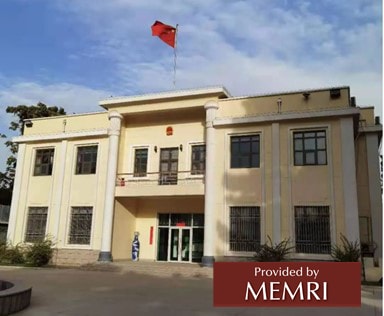
Chinese Embassy in Kabul (Source: Globaltimes.cn)
1992-2001 – China's Relations With The Islamists in Afghanistan
In April 1992, the regime of Mohammad Najibullah, who succeeded Babrak Karmal as the PDPA General Secretary of the Central Committee, collapsed. Clashes erupted and the Islamist managed to take over the country. The country name of Afghanistan was changed into the Islamic State of Afghanistan. It is worth noting that, in order to defeat the Soviet Union, the faction of Gulbuddin Hekmatyar's Hezb-e-Islami received more support by the U.S. than any other Afghan rebel group.
As the civil war in Afghanistan intensified, in February 1993, all the members of the Chinese Embassy in Afghanistan were ordered to leave for security reasons, and the normal exchanges between the two countries were temporarily suspended. It is worth noting that Chinese diplomat Zhang Min served as charge d'affaires of the Chinese Embassy in Afghanistan before the Chinese Embassy removed its entire staff in 1993. In an interview with the Beijing Youth Daily and the China News Service in December 2001, he revealed that the CCP had withdrawn its entire staff from the Embassy in Afghanistan because the Chinese Embassy was repeatedly bombed by mistake during the Afghan civil war. "The [Afghan] Presidential Palace, the Prime Minister's office, the Foreign Ministry and the Security Ministry are all very close to the [Chinese] embassy, so the embassy was often bombed by mistake," Zhang Min said. It is reported that when Zhang Min was still in the embassy, the buildings were hit by 13 rockets, one of the three buildings was seriously damaged, and the safety and living conditions of the staff could not be guaranteed. In this situation, the CCP finally withdrew from Afghanistan in 1993.[18]
By 1996, the Taliban entered Kabul and seized power. China, through its close ally Pakistan, started the process to open diplomatic and economic relations with the Taliban around 1998. In 1999, the Chinese Foreign Ministry sent a delegation of five Chinese diplomats to Afghanistan to meet with senior Afghan Taliban officials. During the visit, the two counterparts opened economic ties and launched flights between Kabul and Urumqi, the capital of Xinjiang region. China's Ambassador to Pakistan Lu Shulin also sought a meeting with then-ruler of Afghanistan Mullah Omar. To that end, a group of Chinese political experts from the Chinese Institute for Contemporary International Relations, a think-tank linked to China's Ministry Of State Security, travelled to Kandahar to prepare.[19] Abdul Salam Zaeef,[20] former Taliban envoy to Pakistan, reported that the Chinese ambassador to Pakistan Lu was the only foreign diplomat to maintain good relations with the Taliban mission in Islamabad.[21]
In December 2000, Chinese Ambassador Lu met with Mullah Omar in Kandahar. Ambassador Lu became the first senior representative of a non-Muslim country to meet the supreme leader of Taliban.[22] During the meeting, Mullah Omar assured Lu that the Taliban "will not allow any group to use its territory for any activities against China."
Commenting on the meeting, Pakistani politician and journalist Mushahid Hussain said that Afghanistan under the Afghan Taliban "was interested in having friendly relations with China." He also stated that, during the meeting between Mullah Omar and Ambassador Lu, the Taliban's supreme commander "had reportedly ensured to respect the sovereignty of China, non-interference in its internal affairs, and not letting anybody use Afghan territory against the neighboring country."[23] In its cooperation with the Taliban regime, the Chinese government asked the Taliban to do its utmost to ensure that there were no armed Uyghur groups in Afghanistan that could threaten China. Since then, the Taliban regime did more or less ensure that a small group of Uyghur insurgents who formed the East Turkestan Islamic Party (ETIP), aka the East Turkestan Islamic Movement, (ETIM), have been kept under its control and restraint. During the period in power, the Taliban permitted ETIM to set up training camps in Afghanistan. However, after the meeting, the Taliban regime handed over 13 Uyghurs to China.[24]
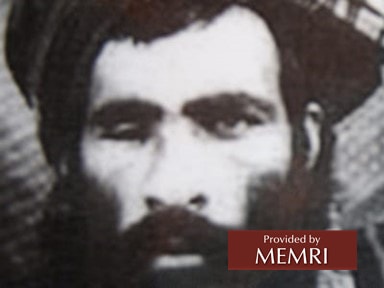
Mullah Omar (Source: Twitter)
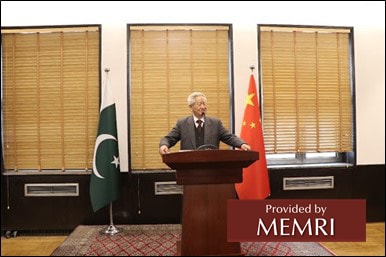
Former China's Ambassador to Pakistan Lu Shulin (Source: Twitter)
China's Relations With The Taliban After 9/11
Chinese Authorities' Involvement In Afghanistan Increased Dramatically In 2014
After the 9/11 terrorist attacks, China's relationship with Afghanistan remained pragmatic and left room for strategic change in the future. While acquiescing in and supporting the U.S.-led offensive to oust the Taliban, the CCP insisted that such retaliation must be consistent with the U.N. Charter, in which the Security Council must play a leading role. This shows that even in the extreme circumstances of the time, Beijing did not completely abandon the Taliban.
The CCP has traditionally been averse to bet on one side only. Since December 2001, Beijing had also maintained close relations and high-level visits with the Afghan governments of Hamid Karzai and Ashraf Ghani.
However, the Chinese authorities' involvement in Afghanistan began to increase dramatically in 2014. Following the killing of Osama bin Laden by U.S. forces on May 1, 2011, President Barack Obama announced in June 2011 that the United States would begin withdrawing troops with the goal of handing over security responsibility to the Afghans by 2014. On December 31, 2014, Obama announced the end of major U.S. combat operations and a shift to training and assisting Afghan security forces. Although Obama later froze the withdrawal for various reasons, the U.S.'s exit from Afghanistan was a foregone conclusion. Hence, Beijing tried to take advantage of the Obama administration's decision, hoping to take the lead in Afghan affairs in the future.
In January 2015, the Washington Post reported that China had hosted a delegation of Taliban officials in Beijing in December 2014. The Chinese government did not confirm the Taliban visit.[25] Furthermore, on February 2015, it was reported that a Taliban delegation visiting Pakistan had met with the Chinese Ambassador to Pakistan Sun Weidong. However, the Chinese government once again denied that information.[26] On May 20-21, 2015, Western media reported that China had hosted secret meetings between the Taliban and the Afghan government in Urumqi. According to reports, three representatives of the Taliban, Mullah Abdul Jalil, Mullah Abdul Razaq, and Mullah Hassan Rahmani, participated in the talks. The Pakistani Inter-Services Intelligence (ISI) facilitated the negotiations.[27] The Chinese government again denied the meeting.[28]
On July 18-22, 2016, an Afghan Taliban delegation led by then group's senior representative in Qatar Sher Mohammad Abbas Stanakzai, visited Beijing. The news agency Reuters reported that a Taliban official, speaking on condition of anonymity, commented: "We have good terms with different countries of the world and China is one among them... We informed Chinese officials about the occupation by invading forces and their atrocities on the Afghan people... We wanted the Chinese leadership to help us raise these issues in world forums and help us get freedom from occupying forces."[29] On August 2016, the CCP media outlet Global Times wrote that China indirectly confirmed the meeting with the Taliban, stating that it maintains contact with all Afghan parties. "In a faxed statement to the Global Times... China's foreign ministry said the country has always supported the 'Afghan-led, Afghan-owned' political reconciliation process and supports the peace talks between the Afghan government and the Taliban so the country can restore stability as soon as possible. 'Therefore, China maintains contact with all parties related to the Afghan issue and is willing to continue playing a constructive role,' the foreign ministry said without providing further details on the visit," the Global Times reported.[30]
Under the Trump administration, the United States and the Taliban started rounds of peace talks, mediated by Qatar, to prepare the American withdrawal. As a consequence, China's efforts to negotiate with the Taliban intensified. In June 2019, Abdul Ghani Baradar, who was at the time the head of the Taliban's political office in Qatar, visited China as part of the efforts to promote the "Afghan peace process."[31] "Both sides believe that this exchange was beneficial and agreed to keep in touch about and cooperate on continuing to seek a political resolution for Afghanistan and fighting terrorism," Chinese foreign ministry spokesman Lu Kang said, commenting on the meeting.[32]
In September 2019, negotiations between the Taliban and the United States in Doha stalled. China therefore attempted to fill the void by inviting the Taliban to come to participate in a two-day intra-Afghan conference in Beijing. On October 23, 2019, Taliban spokesman Suhail Shaheen said that Baradar met with Chinese diplomats in Doha. "China has invited a delegation... to participate in the intra-Afghan dialogue," Shaheen then added.[33] The intra-Afghan conference was scheduled for October 29-30, 2019. However, it was postponed several times, first to November and then ultimately with the start of the COVID-19 crisis, the talks did not take place.
Chinese Foreign Minister Wang Yi's Meeting With Taliban Co-Founder Mullah Abdul Ghani Baradar
However, on July 28, 2021, ahead of the U.S. withdrawal, Chinese State Councilor and Foreign Minister Wang Yi met in Tianjin with Taliban co-founder Mullah Abdul Ghani Baradar, who was then heading the Taliban's political office in Doha, and his delegation. According to the Chinese Ministry of Foreign Affairs, Wang Yi pointed out that "the Afghan Taliban is an important military and political force in Afghanistan and is expected to play an important role in the country's peace, reconciliation, and reconstruction process."
"We hope that the Afghan Taliban will put the interests of the country and nation first, hold high the banner of peace talks, set the goal of peace, build a positive image and pursue an inclusive policy. All factions and ethnic groups in Afghanistan should unite as one, truly implement the 'Afghan-led and Afghan-owned' principle, push for early substantive results in the peace and reconciliation process, and independently establish a broad and inclusive political structure that suits Afghanistan's national realities," Wang Yi said.
During his meeting with Baradar, Wang Yi also stressed that the ETIM is an international terrorist organization designated by the UN Security Council that poses a "direct threat to China's national security and territorial integrity." "Combating the ETIM is a common responsibility for the international community. We hope the Afghan Taliban will make a clean break with all terrorist organizations including the ETIM and resolutely and effectively combat them to remove obstacles, play a positive role and create enabling conditions for security, stability, development and cooperation in the region." Wang Yi stressed, suggesting that Beijing sees security in its western region of Xinjiang as a priority in its relations with the Taliban regime, and is concerned that Afghanistan could once again become a safe haven for separatists fighting for Xinjiang's independence.
For his part, Baradar "expressed appreciation for the opportunity" to visit China. He added that China has "always been a reliable friend of the Afghan people" and "commended China's just and positive role in Afghanistan's peace and reconciliation process." Baradar also said that the Afghan Taliban "will never allow any force to use the Afghan territory to engage in acts detrimental to China."[34]

Chinese Foreign Minister Wang Yi met with Taliban co-founder Mullah Abdul Ghani Baradar in Tianjin. (Source: Fmprc.gov.cn, July 28, 2021)

Chinese Foreign Minister Wang Yi met with Taliban co-founder Mullah Abdul Ghani Baradar and the Taliban delegation in Tianjin. (Source: Fmprc.gov.cn, July 28, 2021)
Conclusion
The CCP has maintained its presence and influence in Afghanistan for many years, and has always maintained explicit or implicit contacts and support for the Taliban. China is not the Taliban's new friend, but rather an old friend.
During his meeting with Chinese Foreign Minister Wang Yi, Taliban co-founder Mullah Abdul Ghani Baradar stressed that China has "always been a reliable friend" and made the same security pledge to the CCP as Mullah Omar made to the Chinese Ambassador to Pakistan Lu Shulin 21 years before, stating that the Taliban will not allow "any force" (i.e., ETIM and maybe even the U.S.) to use Afghan territory to engage in acts "detrimental to China."[35]
The CCP has always stressed that its members, especially its officials, must maintain a high degree of conformity with the central leadership. Under Chinese President Xi Jinping, the requirements are even stricter. Thus, after Chinese Foreign Minister Wang Yi's meeting with Mullah Abdul Ghani Baradar, the Afghan Taliban co-founder, in Tianjin on July 28, which clarified the CCP's stance toward the Taliban, no CCP official could be found to speak openly or directly against the Taliban.
However, commenting on the meeting, Chinese professor Wang Yiwei, of Renmin University, said that the Taliban, though "demonized" by the U.S., is like the PLA during the Chinese Civil War.
Wang Yiwei stated: "As you know, Foreign Minister and State Councilor Wang Yi met with the main leaders of the Taliban. There is a saying in China's diplomacy: 'We can unite all forces that can be united and mobilize all positive factors that can be mobilized.' As we seek to build a community of shared future for mankind, of course we should begin with our surrounding areas, which are our places to settle down and to build foundations for development and prosperity...
"The Taliban, to give an example that might sound inappropriate, is like the People's Liberation Army during the War of Liberation. The current Afghanistan government [i.e., Ghani] is a bit like the Nationalist government [i.e., the Kuomintang], which, despite years of American support, may be decimated by the Liberation Army..."
Wang Yiwei then added: "The Taliban and a lot of people have been demonized by the Americans or by some of our public opinion. The main reason for this demonization is because of the Soviet Union's invasion of Afghanistan in 1979 and its subsequent defeat, actually fueled the Taliban. The word Taliban actually means revolutionary youths who want to overthrow the colonists and invaders. They have three tribal mindsets. The first of their tribal mindsets is that 'there can't be any foreign troops stationed on my land,' so they all want to get rid of all these foreign invaders, and they fought for years to drive away the Soviet Union.
"The second mindset, one of the important principles of their tribes is that 'it's not just my land you can't enter, you can't touch my women, you can't take my gold and wealth either.' Because it is the rule of the tribe, so do not judge it with the mindset of our so-called modern international system of nations. This is not 'advanced vs. Backward,' it is just the fact. Many countries exist among tribes, such as Afghanistan, Pakistan, and many countries in Africa today. They have had this tradition for thousands of years.
"Afghanistan is also an ancient civilization, so you need to abandon this kind of demonization by some novels, American movies, or our public opinion. You need to look at it from the perspectives of their doctrines, we all know it's Islamic doctrines, and at the same time from the angles of some characteristics of their nation, some traditions of their tribes, to understand how they dealt with the Soviet Union, and how they are dealing with the U.S. today."
Wang Yiwei also stressed that China and the Taliban can find a common ground based on their anti-U.S. policies. Wang Yiwei said: "Abandoning the judgment of so-called 'violence,' 'terrorism,' or other values, we now see that the Taliban is not what we demonized. It's very clear for the Taliban, as long as China abides by the three principles just mentioned, of course China is abiding by them, we are different from the U.S.
"So, they declared very early on that they would protect China's core interests, and Afghanistan would not become a country that undermines China's stability, and they would not protect the East Turkestan Islamic Movement (ETIM). They absolutely will not tolerate it. They've made a pledge to us, and they know very well that China is a very powerful country. If they want to control the situation, they must cooperate with China."[36]
On a different note, renowned Chinese Professor Zhao Huasheng, director of the Center for Russia and Central Asia Studies and director of the Center for Shanghai Cooperation Organization Studies, at Fudan University in Shanghai, wrote an analysis, titled "China and Afghanistan," on the day Wang Yi met with Baradar, arguing that even though China opposes the Taliban, it avoids conflict with the movement.
Professor Zhao Huasheng wrote: "China has many concerns on the Afghan issue, but the security and stability of Xinjiang region is the most prominent one. China maintains normal and sound relations with the Afghan government and has taken an active part in Afghanistan's economic reconstruction by providing financial support and other assistance. China supports international help in Afghanistan, but avoids direct military involvement there. China rarely criticizes the U.S. war in Afghanistan, but has doubts about its effectiveness and has refused to join the U.S.-sponsored Northern Distribution Network (NDN), a logistics supply chain that ships war material through Central Asia to Afghanistan. China opposes the Taliban because of its close ties to the 'East Turkistan' group, also known as the Uyghur separatist group, but is careful to avoid direct conflict with the Taliban themselves."[37]
Even though the two analyses differ in style, the common denominator is that China looks for dialogue with the Taliban and can rely on its decade-long experience in Afghanistan and relations with the Afghan Islamist movement since the 1990s.
*Chris King is Senior Research Fellow for the MEMRI Chinese Media Studies Project. King was an active participant in the student protests in China in 1989.
[1] Af.china-embassy.org/eng/sgxw/t1630958.htm, January 21, 2019.
[2]Lawinfochina.com/display.aspx?id=353&lib=tax&SearchKeyword=&SearchCKeyword=, November 22, 1963.
[3] Af.china-embassy.org/eng/sgxw/t1630958.htm, January 21, 2019.
[4] News.cgtn.com/news/2019-09-24/70-years-of-diplomacy-How-PR-China-claimed-its-lawful-seat-in-the-UN-KeWvv1hrLa/index.html, September 24, 2019.
[5] Britannica.com/biography/Mohammad-Daud-Khan
[6] Cn.govopendata.com/renminribao/1979/12/31/1/#528251, December 30, 1979.
[7] Npr.org/2021/04/10/985803697/50-years-later-the-legacy-of-u-s-china-pingpong-diplomacy-faces-challenges, April 10, 2021.
[8] Zhuanlan.zhihu.com/p/77300240, August 9, 2019.
[9] Listen.eastday.com/node2/node3/n403/u1ai640357_t92.html, July 7, 2016.
[10] "In 1980, China would, incredibly, receive military support from the United States to combat the threat from both the Soviet Union and Afghan Communists. In a move designed to bolster the new diplomatic relationship between the United States and the People's Republic of China both for its own value, as well as to counter the Soviet Union, the Carter administration not only sold China military equipment, it also extended Communist China most-favored nation trading status." Thediplomat.com/2018/09/how-the-1980-laid-the-groundwork-for-chinas-major-foreign-policy-challenges/, September 12, 2018.
[11] It is worth noting that China's former Ambassador to Afghanistan (2002-2005), Sun Yuxi, started to get involved in Afghanistan since he was a young diplomat in 1981, helping provide Chinese weapons to mujahideen fighting the Soviets. Bbc.com/news/world-asia-30273431, December 1, 2014.
[12] Zhuanlan.zhihu.com/p/77300240, August 9, 2019.
[13] Fmprc.gov.cn/mfa_eng/ziliao_665539/3602_665543/3604_665547/t18007.shtml,
[14] Sa.sogou.com/sgsearch/sgs_tc_news.php?req=3wfDQ9TkOZCvtJKcrvzqNlHAehtiY0msyJqnN3pOwrA=&user_type=1, January 14, 2020.
[15] Sa.sogou.com/sgsearch/sgs_tc_news.php?req=3wfDQ9TkOZCvtJKcrvzqNlHAehtiY0msyJqnN3pOwrA=&user_type=1, January 14, 2020.
[16] Books.google.com/books?id=GXj4a3gss8wC&pg=PA158#v=onepage&q&f=false, S. Frederick Starr (ed.), Xinjiang. China's Muslim Borderland London, Armonk, NY, M.E. Sharpe, 2004, p. 149, p.158.
[17] China did not have an Ambassador in Afghanistan from 1979 till 2002. See: Fmprc.gov.cn/mfa_eng/ziliao_665539/wjrw_665549/3607_665555/3608_665557/t18085.shtml
[18] 911monitor.com/system/2001/12/13/000215833.shtml, December 13, 2001.
[19] Trtworld.com/opinion/the-odd-couple-china-s-deepening-relationship-with-the-taliban-28712, August 2, 2019.
[20] Theweek.in/theweek/cover/2021/04/29/taliban-will-not-allow-afghan-territory-to-be-used-against-india.html, May 9, 2021.
[21] Hurstpublishers.com/book/my-life-with-the-taliban/; Trtworld.com/opinion/the-odd-couple-china-s-deepening-relationship-with-the-taliban-28712, August 2, 2019.
[22] In October of 1998, the United Nations special representative for Afghanistan met with Mullah Omar.
[23] Kashmirwatch.com, February 9, 2014.
[24] Thediplomat.com/2021/06/chinas-transnational-repression-leaves-uyghurs-no-space-to-run/, June 24, 2021.
[25] Carnegietsinghua.org, March 8, 2015.
[26] Fmprc.gov.cn/mfa_eng/xwfw_665399/s2510_665401/t1244389.shtml, March 10, 2015.
[27] Dw.com/en/secret-taliban-peace-talks-in-china-criticized/a-18478201, May 27, 2015.
[28] Fmprc.gov.cn/mfa_eng/xwfw_665399/s2510_665401/t1266733.shtml, May 25, 2015.
[29] Reuters.com/article/us-afghanistan-taliban-china-idUSKCN10A09H, July 30, 2016.
[30] Globaltimes.cn/content/998033.shtml, August 3, 2016.
[31] Reuters.com/article/us-china-afghanistan-idUSKCN1TL0V9, June 20, 2019.
[32] Reuters.com/article/us-china-afghanistan-idUSKCN1TL0V9, June 20, 2019.
[33] Aljazeera.com/news/2019/10/23/china-invites-taliban-afghan-officials-for-two-day-talks, October 23, 2019.
[34] Fmprc.gov.cn/mfa_eng/zxxx_662805/t1895950.shtml, July 28, 2021.
[35] Fmprc.gov.cn/mfa_eng/zxxx_662805/t1895950.shtml, July 28, 2021.
[36] See MEMRI TV clip No. 9056, Chinese Professor Wang Yiwei: The Taliban Are The 'Liberation Army' Of Afghanistan; They Are Demonized By The U.S., But Are China's 'Good Brothers', August 8, 2021.
[37] Ciss.tsinghua.edu.cn/info/china_wzft/3806, July 28, 2021.


